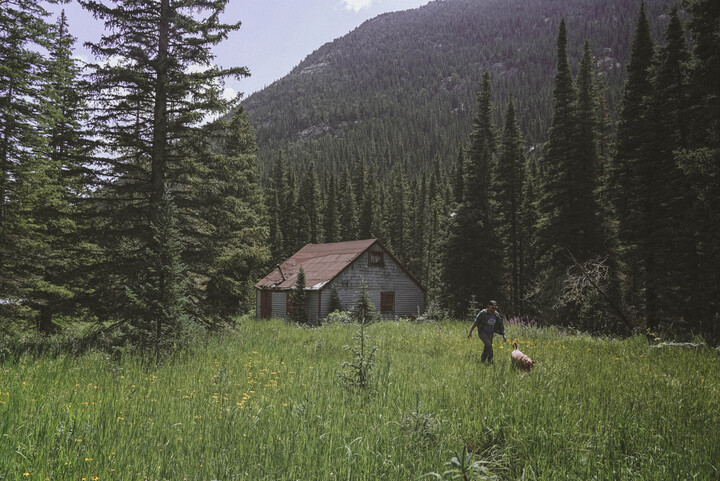Have you ever tried to fall asleep when you were uncomfortable?
Maybe you’re remembering an overnight flight or trying to sleep on a long car ride. I’m thinking of being in a bed that’s not mine, or my pillow being a tad too flat, or a blanket not being heavy enough, or a blanket being too heavy, or one of my pant legs being higher than the other, or any amount of my hair being in my face. (I’m not crazy, you’re crazy.)
It’s hard to rest when we’re uncomfortable.
Have you ever tried to fall asleep hungry?
It takes a long time for me to ignore my rumbling stomach and then not get caught in a mental hamster wheel of thinking about not thinking about being hungry.
It’s hard to rest when we’re hungry.
When we are uncomfortable or hungry, we are not content.
We cannot rest if we are not content.
How does the most well-known psalm start? “The LORD is my shepherd; I shall not want” (Psalm 23:1, emphasis added).
What does that mean?
Does it mean that if the Lord is our Shepherd, we will never want anything other than him? Not according to the rest of the psalm, which talks about God leading us to green pastures and still waters, providing us with a feast, anointing us with oil, and having plenty of wine.
But I want to pause and point out the order of what is stated in the psalm. David didn’t say, “The Lord leads me to green pastures and still waters, I shall not want.”
He didn’t say, “You prepare a table before me in the presence of my enemies, I shall not want.”
He didn’t say, “You anoint my head with oil, my cup overflows, I shall not want.”
He said, “The LORD is my shepherd; I shall not want.”
What does that mean?
I’ve heard people talk about being “content in the Lord,” and I always thought I knew what it meant. But truthfully, it’s a little vague. Recently, the Lord has made me aware of areas in my life where I have not been finding contentment in him. I repented and have been leaning into this, seeking and praying for answers. What does it mean to be content in the Lord?
Before I submit my thoughts on what it means, I want to talk about another shepherd: Moses.
Moses was a shepherd in the wilderness for forty years. Stop and think about that. That’s more years than I’ve been alive, and he spent them all in the desert taking care of sheep. And that was after he lived in Egypt for forty years.
By the time Moses led the people of Israel out of Egypt he was literally eighty years old. I love The Prince of Egypt, but the movie’s creative liberties have forever skewed my mental picture of Moses leading the people out of Egypt. Picture your grandpa showing up to Pharaoh’s palace and saying, “Hey, you gotta let God’s people go!”
God preserved Moses and called him to lead the Israelites out of Egypt (Exodus 1-3). Not only was it his personal calling, but leading God’s people into the promised land was going to be the fulfillment of a promise that was four hundred years old. Four hundred years, guys. That’s longer than America has been a nation.
God made a covenant with Abraham that he would give the land of Canaan to Abraham’s descendants (Genesis 15). Four hundred years later, it was finally happening. And Moses was the person who was going to lead Abraham’s descendants into fulfillment, into the land of promise. All of history had been leading up to this monumental event, and all of Moses’ eighty years of life had led up to this moment.
After the Exodus, the people of God failed to live up to their calling (as we always will), and they spent forty years in the wilderness before entering the promised land. Another forty years, guys. They wandered, then after centuries of anticipation the people of God were going to enter their land of promise. But Moses wasn’t allowed to go with them.
The man God chose to lead his people out of slavery, the man who parted the Red Sea, the man who received the tablets of the covenant inscribed with the Ten Commandments, the man who oversaw the building of the tabernacle, the man who led the people of God to their long-awaited fulfillment, did not get to enter the promised land.
Can you imagine the disappointment?
Moses even begged God to change his mind at the last minute, but God wouldn’t (Deuteronomy 3:23–28). Moses must have been devastated. His life had led up to this moment! He was about to fulfill his calling, he was about to stand on the soil of proof that God is faithful.
After Moses died, there’s an interesting passage at the end of Deuteronomy. It sounds like a eulogy:
And there has not arisen a prophet since in Israel like Moses, whom the LORD knew face to face, none like him for all the signs and the wonders that the LORD sent him to do in the land of Egypt, to Pharaoh and to all his servants and to all his land, and for all the mighty power and all the great deeds of terror that Moses did in the sight of all Israel.
Deuteronomy 34:10–12
Moses knew the Lord face to face.
After the Israelites made the golden calf, God said he would send them away from his presence and allow an angel to guide them into the promised land. But Moses interceded for the people:
“If your presence will not go with me, do not bring us up from here. For how shall it be known that I have found favor in your sight, I and your people? Is it not in your going with us, so that we are distinct, I and your people, from every other people on the face of the earth?”
Exodus 33:15–16, emphasis added
The thing that sets God’s people apart, the thing that makes us “distinct,” is that God is with us. God is with us, God was with them, and God was with Moses.
For all the years they were in the wilderness, God was with his people. And Moses spoke with God “face to face, as a man speaks to his friend” (Exodus 33:11).
From the time God called Moses, he promised to be with him (Exodus 3:12). From the moment Moses led the Israelites out of Egypt, God showed them he was with them. He led them in a pillar of cloud by day and a pillar of fire by night to direct their journey, but also to communicate that he was with them (Exodus 13). He provided bread and meat for them—further indicators of his care for them and his presence with them (Exodus 16).
When the people complained about not having water, they “grumbled” and “tested” the Lord. What did they test the Lord about? “. . . they tested the LORD by saying, ‘Is the LORD among us or not?’” (Exodus 17:7, emphasis added).
This is absolutely crucial. Remember how I started out talking about contentment and rest? Hebrews 3–4 tells us there is a Sabbath rest that remains for the people of God. Hebrews 3–4 quotes Psalm 95, which refers to the “testing” and “grumbling” in Exodus 17. (Stay with me!)
The promised land pointed to a truth about God: he brings his people into rest (see Exodus 20:8–11; Joshua 11:23; 14:15). But there are prerequisites to entering God’s rest. Exodus 17 says the people questioned God’s presence. Psalm 95 says they rejected his voice and did not know his ways. Hebrews 3–4 warns against having an unbelieving heart.
So in order to enter God’s rest we must have faith. Faith that believes God when he speaks, faith that seeks to learn and trust his ways, and faith that believes he is with us.
The Israelites had to wander in the wilderness for forty years before entering the promised land because they questioned God’s presence; they did not believe he was with them.
So what does this have to do with Psalm 23?
If the Lord is our Shepherd, then he is our provider, our guide, our protector, our comforter. But he is not any of these things unless he is first present.
If the Lord is our Shepherd, then the Lord is with us.
“The Lord is my shepherd, I shall not want.”
What does that mean?
I submit that it means that because the Lord is our Shepherd, we do not lack anything. He does provide for our physical needs, but that is not why we don’t lack anything. The reason we do not lack anything is that he is with us.
The story of Moses asks the question, “Is that enough?”
Is his presence enough? Is it enough that he is with us? Will we be content with that? Will we be content even if—like Moses–we do not experience fulfillment of the promise? Will we be content if we never “fulfill our calling”? Will we be content even if, after endless anticipation, we do not get the things we so deeply and rightly desire?
The Lord is our Shepherd, so we do not lack anything.
The Lord is with us, so we do not lack anything.
If we believe this, if we find contentment in the presence of God, then we will be free to enter his rest.
I’ve heard people describe “the presence of God” and refer to a worship service, or a time of prayer, or a rare moment of extraordinary encounter. And those are all necessary. But if God is always with us (Matthew 28:20), then God is always with us.
What if contentment in the Lord looks like believing that he is with us?
What if “striving to enter his rest” looks like choosing to believe every moment that he is with us and that is enough?
What if we are content in him when we are with him and that is enough?
Photo credit: Michael Marcagi
Abbi lives in Charlotte, NC and is currently enrolled in a graduate certificate program at Gordon-Conwell Theological Seminary. She nannies full-time and enjoys writing, cooking, thrifting, and spending quality time with friends and family.







3 comments
What a beautiful reminder!!! May we always find our contentment in the Great Shepherd!! Such an encouraging read!
So I have a hard time believing God will do good things for me, though I have seen Him do could things for me and I know these happened from Him, but I still have a hard time believing that. I know that I know that I know who God is and what He has done and that He loves me and is with me and will never leave me, but there’s always this nagging of “is that really true” “He won’t really do those things for you”, leaving me in this fairly continuous doubting place, questioning my salvation, questioning my faith, questioning God sometimes…it’s a mess really. Then I wonder if I just have too much pride to accept I am not saved, never was, and that I don’t want to admit it, leaving me with “will I ever be saved then”.
Hi Amanda! I know you left your comment quite some time ago, but I just stumbled upon this page today and wanted to to respond. Not sure if you or anyone will ever see this lol but I really relate what you said about having a hard time believing that God will do good things for me too. I had wrestled with that thought for a while before I was ever able to admit it. I think it stems from seeing God do amazing things in other people’s lives and desiring those things ourselves but not or not yet receiving them. It makes you wonder if God has those same good things planned for you or not. I think what I’ve learned is that trusting God is not about believing that He will give you every good thing you desire. Trusting God is more about trusting His wisdom and His plan and His idea of good for each of our lives. Our own personal idea of “good things” may differ from his good plan. But true trust is believing that He is wise and loving in His ways and that He is at work to fulfill what HE KNOWS is actually good for our lives. He’s working all thing together for the good of those who love Him (Romans 8:28) That good may just look different from our idea of good. But He knows what we need way better than we do, so I try to remember that when I have moments of doubt or or anxiety or sadness about how my life looks. He’s working things out. We just have to lean on and leave it to Him : ) Side note… I think the fact that you’re asking these questions and really thinking about God and His work in your life is proof that you love Him and want to live for Him. The enemy tries to plant doubts and lies in our head to convince us that we’re not saved or that we aren’t doing things right. The enemy’s goal is to try to push us away from God. Don’t fall for it. God has you and will never forsake you. He sees you and He loves you forever <3 God bless!